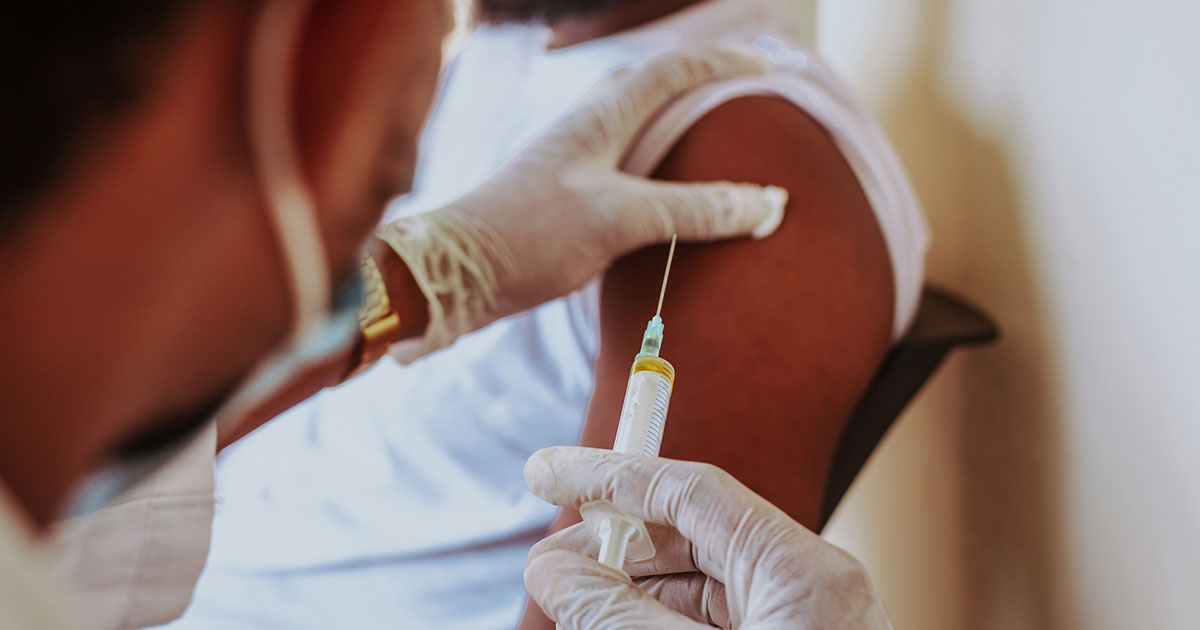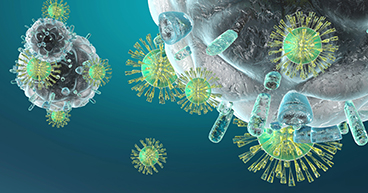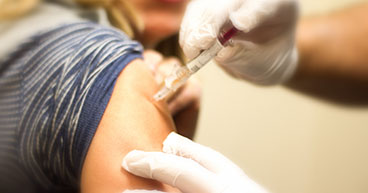
A large spike in respiratory syncytial virus (RSV) and an earlier-than-expected arrival of the flu last year combined to create one giant respiratory mess—specifically, one of the worst flu seasons of the past decade.
The U.S. Centers for Disease Control and Prevention (CDC) reported between 27 million and 54 million cases of influenza nationwide last year, causing 300,000 to 650,000 hospitalizations and leading to up to 58,000 deaths.
One of the reasons last year’s flu season was so severe is because fewer people came down with the virus during the first two years of COVID-19—due to social distancing, masking and other preventive measures—leaving them more likely to get the flu once pandemic precautions ebbed.
That’s a big point infectious disease experts are making when they encourage everyone, including cancer patients, to get the flu vaccine as soon as it’s available this year.
“With mask mandates dropping, people becoming more lax with overcrowding and folks falling back to their pre-pandemic ways, there is a good possibility that we will see an uptick of RSV, COVID-19 and the flu,” says Suji Mathew, MD, Infectious Disease Physician and Chief of Medicine at City of Hope Atlanta.
In this article, we’ll explore:
- Why cancer patients should get the flu shot
- Timing the flu shot around cancer treatments
- Should you get the RSV vaccine?
- Should you get the flu and COVID-19 vaccines together?
- What to expect during the 2023 flu season
If you’ve been diagnosed with cancer and are interested in a second opinion on your diagnosis and treatment plan, call us or chat online with a member of our team.
Why cancer patients should get the flu shot
The flu is a contagious respiratory illness caused by influenza viruses that infect the nose, throat and sometimes the lungs.
Most people recover from influenza without treatment. But, for some, it may lead to much more serious conditions.
“The flu can cause pneumonia, respiratory failure, encephalitis (inflammation of the brain) and other serious complications, including death,” Dr. Mathew says. “It’s not a disease that should be taken lightly.”
With few exceptions, the CDC and national medical experts recommend everyone 6 months and older get the flu shot every year. Those ages 65 or older, as well as infants, young children and immunocompromised individuals, including cancer patients, are especially susceptible to the virus. Other high-risk groups include pregnant women and people with a chronic condition, like diabetes or asthma.
Getting the flu may lead to serious complications for cancer patients, whose immune systems are weakened by treatments, such as chemotherapy and radiation therapy. Because of this, medical professionals strongly advise cancer patients, and those who spend time with them, to get the flu vaccine.
Getting vaccinated is the most important step cancer patients, caregivers and their families can take to protect themselves and others from the flu, which is easily transmitted through coughing, sneezing or even through touch, Dr. Mathew says. And people can transmit the virus a day or two before they have symptoms.
“When the flu vaccine becomes available, you should get it,” she says. “It’s a good preventive tool to use. It’s an important first step for caregivers and family members of cancer patients to take to prevent getting an infection.”
Also, the flu vaccine is not a live virus so it can’t cause influenza, says Dr. Mathew, despite some false claims to the contrary. In fact, the flu vaccine, when given as a shot, contains either an inactivated virus or viral antigens. The shot may cause a mild fever and pain at the injection site, but that’s just a reaction to the vaccine, not the flu itself.
The flu vaccine also provides protection for up to one year—covering the typical U.S. flu season from October to May—even though misconceptions persist that its effectiveness doesn’t last, Dr. Mathew says.
Timing the flu shot around cancer treatments
Long-term cancer survivors and patients who aren’t in active treatment should get the flu vaccine as soon as they can.
There are some caveats, however.
Patients who have been recently diagnosed, are in treatment or are about to start treatment should talk to their doctor about the best time to get the flu shot. That’s because some cancer treatments, especially chemotherapy, may damage or suppress the immune system, making vaccines less effective.
Patients diagnosed with blood cancers, such as leukemia or lymphoma, also may not fully benefit from the vaccine, but they should still get the flu shot unless they had serious side effects from it in the past.
Dr. Mathew recommends that patients who haven’t started treatment get the vaccine at least two weeks before treatment begins. Patients who are on treatment cycles should talk to their doctor about when in the cycle they should get vaccinated.
Should you get the RSV vaccine?
RSV is a highly contagious virus that may cause a minor cold-like symptoms for up to two weeks. But it may also be serious, especially in senior citizens. The CDC says RSV may cause up to 120,000 hospitalizations and 10,000 deaths of Americans 65 and older this season. “Older adults, in particular those with underlying health conditions, such as heart or lung disease or weakened immune systems, are at high risk for severe disease caused by RSV,” says Peter Marks, M.D., Ph.D., director of the Center for Biologics Evaluation and Research at the U.S. Food and Drug Administration (FDA).
Fortunately, doctors are heading into the season with a few new weapons against RSV in their arsenal. The FDA has approved two vaccines for RSV for adults older than 60, as well as a new monoclonal antibody for RSV that’s approved not just for infants at high risk, but also for all healthy infants up to age 2, Dr. Mathew says.
“It’s possible we’ll see a reduction in RSV infections among our most vulnerable age groups if more people get vaccinated,” she says. The CDC recommends adults 60 years and older receive the one-dose inoculation but should discuss the vaccine with their doctor. Parents, women who are pregnant and others with underlying conditions should also talk to their doctor about whether the vaccine is right for them or their children.
Should you get the flu, RSV and COVID-19 vaccines together?
While the official COVID-19 public health emergency is over, the virus appears here to stay—at least for now.
As of mid-August, the CDC began tracking a newly discovered strain of COVID-19 called BA.2.86, classified as a “variant under monitoring” by the World Health Organization (WHO).
In July, the WHO announced that the number of new COVID-19 cases reported worldwide rose by 80 percent, in part due to the spread of new Omicron variant EG.5, which the WHO designated a “variant of interest.” More than 17 percent of all reported cases were EG.5 in mid-July, up from 7.6 percent a month before.
“Currently with the new circulating COVID strains, hospitalizations have increased nationwide, although they’re still significantly lesser than the peaks seen at the same time last year,” Dr. Mathew says. “A combination of natural immunity and vaccine-derived immunity is helping keep the rates of hospitalizations and deaths down.”
The newest version of the COVID-19 booster is expected be available this month, according to the CDC, and should cover the predominant circulating strains.
It’s also important to know that the vaccine for RSV or the flu will not protect patients from COVID-19, and vice versa.
“The purpose of the flu vaccine is the same as the COVID vaccine,” Dr. Mathew says. “The goal is to prevent serious complications and death and reduce hospitalizations. So even if someone tests positive for COVID or the flu, but they have relatively minor symptoms, then the vaccine has done its job.”
It also helps to remember that one way to tell the difference between the flu and COVID-19 is the rate at which symptoms develop. Severe symptoms of the flu may come on suddenly and go away quickly, while COVID-19 symptoms tend to develop more gradually, with severe symptoms often not appearing for several days after exposure. What’s more, the National Institutes of Health estimates about 10 percent of adults infected with the virus experience what’s called long COVID, defined as having symptoms for more than three months.
The CDC recommends everyone age 6 and older get an updated COVID-19 vaccine. The agency also recommends some people talk to their doctor about additional doses if they are:
- 65 an older
- Have a compromised immune system
While the CDC suggests that it’s safe to get vaccines together, Dr. Mathew says spacing the shots apart, if possible, may have some benefit.
“If you get them at the same time and get some side effects, you may not know which vaccine caused those side effects,” she says.
You should talk to your doctor about the timing of your vaccines.
You also may want to get your next COVID-19 booster shot in the same arm as your last COVID-19 shot, according to a recent study, which found that when immune cells in local lymph nodes are restimulated in the same place, there’s a greater immune response.
What to expect during the 2023 flu season
While last year was a tough one for respiratory viruses, experts predict that levels of the flu and RSV will return to normal seasonal patterns this year. Of course, when the CDC estimates that the flu kills between 12,000 and 52,000 Americans each year, typical doesn’t mean easy.
No matter what this flu season brings, it’s important to be prepared. Taking action to reduce your risk—starting with getting a flu shot, preferably in September or October—can help keep you healthy and the flu and other respiratory infections at bay.
Make sure you:
- Wash your hands frequently
- Avoid crowded areas
- Avoid people who are sneezing or coughing
Additionally, cancer patients should call their doctor if they’ve been in contact with someone who’s sick. They may be able to prescribe antibiotics to help keep the flu from developing.
If you’ve been diagnosed with cancer and are interested in a second opinion on your diagnosis and treatment plan, call us or chat online with a member of our team.



